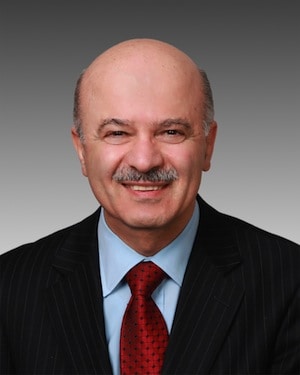When asked about his professional background, the Honourable Reza Moridi, the soft-spoken and articulate Ontario Minister of Research and Innovation, claims that he “wore various hats” before entering politics. Some of these distinguished hats are those of a professor, a university administrator, and a business executive. Moridi also has an extensive scientific background, having worked in the field of health physics and done extensive work in the nuclear industry — specifically in the area of radiation protection. Moridi spoke to The Varsity about the unique perspective that scientists can bring to the political sphere, the mutual dependence of fundamental and applied scientific work, and the nature of research.

Minister of Research and Innovation Reza Moridi. MEDIA PHOTO
The Varsity: You seem to be the model of a socially conscious scientist; you’re highly educated in nuclear and health physics, and you’ve also been very influential in the government dealing with research-related issues. What recommendations would you give to scientists or students who are concerned about education, awareness, and other social issues, but who may not see a political career in their future?
Reza Moridi: You know, I encourage scientists to enter politics. We don’t have very many scientists in the political arena, so I really encourage scientists to pursue politics — not as a job, but as a public service. Scientists bring another perspective to the political arena. In the political field, we are all generalists, so the lawyers, teachers, engineers, scientists, nurses, doctors — each niche brings various perspectives to the political arena. And I think that helps society as a whole. In that sense, I really encourage scientists to consider running for the office.
TV: The provincial government recently increased its funding for research. In the announcement, you cited social and economic benefits as well as the good of science itself, but I’ve noticed that recent science-related announcements from the federal government have focused more narrowly on the economic benefits of research. Would you say that the attitude toward science is changing in Canada?
RM: Well, I’ve heard those announcements from our federal officials. I hope not. I hope not, because scientific development is not separate from economic development. We have to be far-sighted — we can’t be short-sighted with our policy-making.
I’ll give you an example. Not very long ago, in 1905, Albert Einstein said that nothing can travel faster than the speed of light — a very visionary scientist. Based on that vision, he came to a few mathematical formulas, and after that, he showed that mass and energy are convertible, meaning that you can break atoms to produce energy. Today, there are [about] 500 nuclear reactors around the world producing energy. There’s so much use of nuclear energy, and this is all based on very fundamental science which Albert Einstein created in 1906. What I’m trying to get at is that today’s fundamental scientific work is tomorrow’s applied science. We have to be far-sighted. We have to pay attention to very fundamental, basic scientific development, as well as commercialization of research and innovation where economic impacts can be seen.
Research is a journey that starts with imagination and dreaming, and then ends with the sale of a product, and in between you have the creation of knowledge, innovation, invention, research, manufacturing, and of course marketing and sales. This is a whole chain. You have to pay attention to every element of that chain.
TV: What are some of the major challenges in allocating these resources among innovators working across a wide range of disciplines? Is there a demarcation between pure and applied research funding?
RM: As I said, we pay attention to the whole spectrum, but in the mean time we have some focus areas such as bioeconomy, advanced health technology, information and communication technologies — these are some of the focus areas, but we fund research in every aspect of the sciences, the social sciences, and the humanities.
I want to stress that research and innovation is the engine of economy. Sometimes I say again that the Ministry of Economic Development, Trade and Employment is the Ministry of Economic Development for today, and the Ministry of Research and Innovation is the Ministry of Economic Development for tomorrow. And I say, tomorrow begins today.
This interview has been edited for length and clarity.

